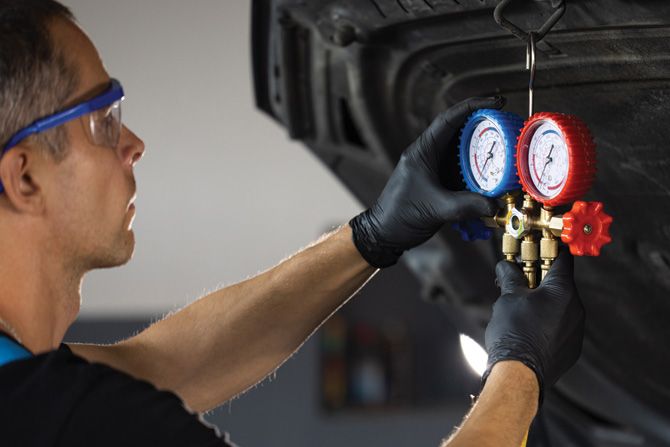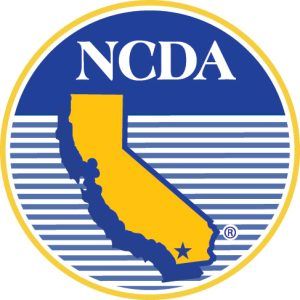All shop employees repairing/servicing/diagnosing or working in any way on A/C systems must receive training and a certificate from an EPA-approved training program.
ince July 1992, regulations promulgated under the Clean Air Act (CAA) require that motor vehicle air conditioning refrigerant be recycled. In 2006, auto dealers in the San Francisco area were penalized for violations arising under this act. Serious penalties and legal drama followed.
We must note that these CAA regulations are federal and applicable to all auto dealers in the U.S. and not to San Francisco dealers alone. To achieve compliance with this regulation, dealers must act as follows:
- Clean Air Act Section 609 Technician Certification Program: All employees working on A/C systems must be trained and tested by a program approved by the EPA on how to properly recover and recycle refrigerant (such as Freon 12, HFC-134[a] or any other EPA approved refrigerant).
- Clean Air Act Section 609 Approved Equipment: Section 609 mandates that technicians must use EPA-approved equipment to perform refrigerant recovery and recycling. (For a list of approved equipment, go to epa.gov/mvac/section-609-certified-equipment.)
All shop employees repairing/servicing/diagnosing or working in any way on A/C systems must receive training and a certificate from an EPA-approved training program. (The list of training programs is available at epa.gov/mvac/section-609-technician-training-and-certification-programs.) We note that training programs on A/C systems provided by auto manufacturers are a requirement to repair and service automobiles, but they do not in any shape or form help in compliance with this law. Training programs provided by other government bodies, such as the South Coast Air Quality Management District, also do not help achieve compliance with this law. The training program undertaken by the employees must be on the EPA-approved list.
We recommend that you do not allow any employee without training to work on A/C repair or service unless the employee has provided management with a copy of certification from an EPA-approved body. A copy of the certificate should be retained under a file marked “Air Quality,” with a copy sent to Human Resources (Business Office) for retention in the employee file.
IMPORTANT: you may need to keep a copy of the certification three years beyond the date of departure of the tech!
Straight Talk On Refrigerant Recycling Training
THE LAW: Federal law prohibits releasing CFC-12 into the atmosphere. The prohibition on venting Freon-12 into the atmosphere has been in effect since 1992. This 1992 regulation established standards for equipment that recovers and recycles CFC-12 refrigerant from motor vehicle air conditioners, rules for training and testing technicians to handle this equipment, and record-keeping requirements for service facilities and refrigerant retailers. Another rule published in May 1995 established a standard for equipment that recovers but does not recycle CFC-12 and training and testing technicians to handle this equipment.
APPROVED EQUIPMENT: Technicians repairing or servicing vehicle air conditioners must use either recover/recycle or recover-only equipment approved by the EPA. The EPA-approved recovery/recycling equipment cleans the refrigerant so that oil, air, and moisture contaminants reach acceptably low levels.
TECHNICIAN TRAINING AND CERTIFICATION: Technicians who repair or service CFC-12 and HFC-134a motor vehicle air conditioners must be trained and certified by an EPA-approved organization. R-1234yf is now the choice of refrigerant for new models of automobiles. As of Jan. 1, 2018, technicians must show their certification card to purchase R-134a and R-1234yf refrigerant in quantities of two pounds or more. Training programs must include information on the proper use of equipment, the regulatory requirements, the importance of refrigerant recovery, and the effects of ozone depletion. To be certified, technicians must pass a test demonstrating their knowledge in these areas.
RECENT HAPPENINGS: EPA has started rigorous enforcement against dealers and fined dealers $20,000+ for having non-certified technicians work on automobile air-conditioning systems. Technicians are required to adhere to this training and certification diligently.
Straight Talk For Technicians
WHAT TECHNICIANS MUST DO: All techs must obtain a copy of their certification and forward it to the Service Manager. They should also provide a copy to the Business Office for retention in their employee file. Employees not certified must decline all A/C-related jobs and notify the dispatcher and the Service Manager of their inability to perform the work. Anyone working on A/C without certification violates Federal law and is subject to disciplinary action and perhaps termination from the dealership. If a technician loses their certificate card, they should immediately contact the issuance company to receive a new copy. If reissuance is impossible, the tech should retake the training from the list of EPA-approved training programs.
HOW TO VERIFY CERTIFICATION: Only EPA-approved training programs are valid for this law. Training from the auto manufacturer or other government agencies such as SCAQMD is NOT valid for this law. (The list of EPA-approved training programs is available at epa.gov/mvac/section-609-technician-training-and-certification-programs.) Verify that the training certificate issued is from an agency on the approved list. If not, the tech must complete certification through an approved agency before working on any A/C-related job.
FOR LUBE TECHs OR BODY SHOP TECHs: If you are a lube tech, there is a good chance that sooner or later, you will become a regular tech, so get your A/C training certificate now. Also, if you work in a body shop installing A/C hoses or condensers, it involves the refrigerant and hence requires certification.
The language of federal law is very expansive. It states, “No person repairing or servicing motor vehicles for consideration may perform any service on a motor vehicle air conditioner involving the refrigerant.”







